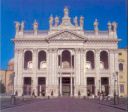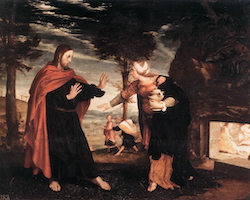» Enjoy our Liturgical Seasons series of e-books!
"Lastly, He showed himself to the Eleven themselves while they were at table. He reproached them for their incredulity and obstinacy.... And He said to them, 'Go out to the whole world; proclaim the Good News to all creation'" (Mark 16: 14-15).
On coming out of the baptismal font on Easter Sunday, the neophytes (newly baptized) were given a white symbolic garment, which they wore throughout the Easter Octave. Easter Saturday was known as "the Saturday on which white vestments are laid aside," or Saturday in albis (depositis), also called "Low Saturday." The octave ends tomorrow, but the Easter Season continues for five more weeks.
See Catholic Culture's Easter Workshop for celebrating the Easter season.
Meditation Saturday within the Octave of Easter:
The Church is Mission
Throughout the Octave of Easter, stational pilgrims have been reminded that the sacrament of Baptism confers responsibilities. Today’s Mass readings stress the evangelical dimension of those responsibilities.
The Gospel reading, taken from the extended ending to St. Mark, records the Risen Lord’s instructions to the eleven disciples: “Go into all the world and preach the Gospel to the whole creation.” The testimony of Peter and John from the Acts of the Apostles shows that this command was taken seriously; after being told by the elders of the Temple “not to speak or teach at all in the name of Jesus,” the two apostles reply, “we cannot but speak of what we have seen and heard.”
When he first came to today’s statio as the Successor of Peter on May 7, 2005, Benedict XVI spoke from his cathedra as Bishop of Rome about the evangelical responsibility of every member of the Church: “All Christians in their own way can and must be witnesses of the Risen Lord.” All must feel compelled to “speak of what [they] have seen and heard.” This responsibility falls in a special way on those ordained to the ministry of the Word. But evangelism is not a matter for the ordained only. It is a common obligation, conferred by Baptism and reaffirmed by the gift of the Holy Spirit in Confirmation. That second sacrament of initiation, Benedict suggested, has much to do with the how and the what of every Christian’s call to be an evangelist:
The Lord promises the disciples his Holy Spirit…[who] will give “power” to the disciples…and guide them to the whole truth. As the living Word of God, Jesus told his disciples everything, and God can give no more than himself. In Jesus, God gave us his whole self, that is, he gave us everything…In him, in the Son, all has been said, all has been given…The Holy Spirit, therefore, is the power through which Christ causes us to experience his closeness…[For the] Risen Christ needs witnesses who have met him, people who have known him immediately through the power of the Holy Spirit: those who have, so to speak, actually touched him can witness to him.
It is in this way that the Church, the family of Christ, “beginning at Jerusalem”…speaks to the very ends of the earth. It is through witnesses that the Church was built.
This emphasis on witness and evangelism—every Christian’s responsibility to testify to “what we have seen and heard”—is a twentieth-century development in the Catholic Church, although it clearly draws on the most ancient Christian traditions. In a 1991 essay analyzing Blessed John Paul II’s consistent emphasis on evangelism, Cardinal Avery Dulles, SJ, traced the full emergence of this theme (which had been anticipated in certain streams of theological exploration in the first half of the twentieth century) to the Second Vatican Council (1962-1965). The First Vatican Council (1869-1870), the cardinal noted, used the Latin word evangelium [gospel] only once, and as a synonym for the four canonical gospels in the New Testament. By contrast, Vatican II spoke of “the Gospel” 157 times, of the imperative to “evangelize” 18 times, and of “evangelization” 31 times. Beginning with his homily in Santo Domingo in 1992, on the fifth centenary of the planting of the Gospel in the Western Hemisphere, John Paul II put the “New Evangelization,” and every Christian’s responsibility to participate in it, at the center of the Catholic Church’s self-understanding. And this, Cardinal Dulles comments, marked a dramatic shift that presaged a new Catholic approach to evangelical mission in the twenty-first century and the third millennium:
For centuries, evangelization had been a poor stepchild. Even when the term was used, evangelization was treated as a secondary matter, the special vocation of a few priests and religious. And even these specialists were more concerned with gaining new adherents for the Church than in proclaiming the good news of Jesus Christ. Today, we seem to be witnessing the birth of a new Catholicism that, without loss of its institutional, sacramental, and social dimensions, is authentically evangelical.
In the 1991 encyclical Redemptoris Missio [The Mission of the Redeemer], John Paul II taught that the Church does not have a mission, as if “mission” were one among many things the Church does; the Church is a mission. Mission is the essence of the Church; mission is the reason for the Church; and the responsibility for mission, for witnessing to “what we have seen and heard,” falls on everyone in the Church.
That is why John Paul II and Benedict XVI both stressed the importance of deepening one’s personal relationship with the Lord Jesus—in Benedict’s preferred terminology, deepening “friendship with Jesus.” Only those who know the Lord can be his witnesses. Only those who have “seen and heard” on a regular basis can testify to the things they have witnessed. The deepening of personal faith is essential to empowerment for mission….
As the station church road from Ash Wednesday to Divine Mercy Sunday draws to an end, stational pilgrims who have passed through the “annual catechumenate” of the Forty Days, and who have heard the Risen One’s command to bring the Gospel to all nations during the Easter Octave, might well reflect on how, in going to Galilee and beyond, the imperative to tell of “What we have seen and heard” will be met: in marriages and families, in neighborhoods and parishes, in business and the professions, in public life, and in culture. Will this year’s stational pilgrims bring others to the living waters of Baptism, or to the renewal of baptismal promises, a year from now?
—George Weigel, Roman Pilgrimage: The Station Churches

Saturday in the Octave of Easter
Station with San Giovanni in Laterano (St. John Lateran):
In Rome, the Station is at the church of St. John Lateran, the mother church of Christendom. Eight days ago the Easter vigil liturgy took place in this basilica. Today the neophytes return a final time to the place of baptism.
For more on San Giovanni in Laterano, see:
For further information on the Station Churches, see The Stational Church.






